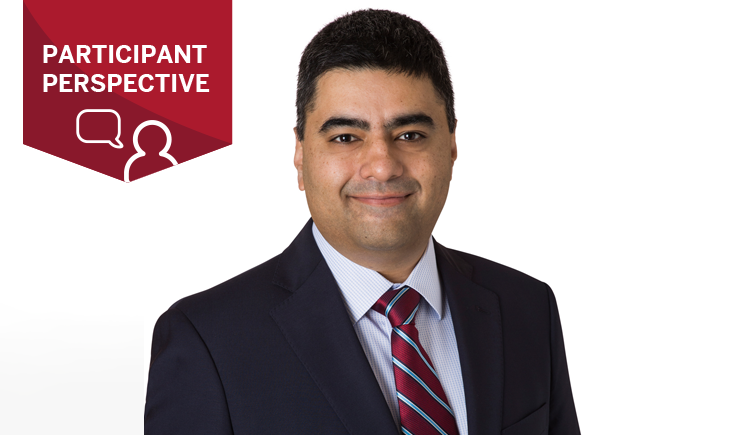
The latest medical simulation technologies provide valuable training opportunities for surgeons to refine their technique and decision-making skills. This can lead to improved operative performance, enhanced leadership capabilities, and better outcomes overall.
Over the past decade, advances in technology have led to great strides in the operating theater. As new techniques and strategies become available, there is a growing need for surgeons to be able to practice different procedures and scenarios without causing any risk to patients. That’s where simulation training provides a valuable opportunity for physicians to round out their clinical experience, while also building their capacity in non-technical areas. This helps them be well-positioned for success as they progress into higher leadership roles, says Sayeed K. Malek, MD, FACS.
Dr. Malek is the Clinical Director of Transplant Surgery Physician Lead, Transplant QAPI at Brigham and Women's Hospital, and Assistant Professor of Surgery at Harvard Medical School. He also serves as one of the program directors for the Surgical Leadership Program.
This one-year post-graduate certificate program, which is geared to mid and advanced level surgeons, is designed to equip learners with the knowledge and resources necessary to help them advance in their leadership aspirations, or strengthen their status in current leadership positions.
“Surgeons spend so many years learning surgery technique but there’s nothing on leadership, so they often find themselves thrust into leadership roles with no education or training in this area,” says Dr. Malek. This program helps fill to the gaps by broadening out their knowledge base and honing their practical, non-surgical skills needed to succeed in the evolving field.
By the end of the 12-month program, participants will be ready to apply their learnings to “mobilize and drive change across their organizations,” he adds.
Exploring the Benefits of Medical Simulation
One important benefit for surgeons who participate in the Surgical Leadership Program is the unique chance to train in the STRATUS Center for Medical Simulation’s setting at Brigham Women’s Hospital.
Simulation training offers surgeons a hands-on approach to become skilled at a variety of surgical procedures in a virtual setting that closely resembles the actual operating room, Dr. Malek stresses.
“This simulation-based learning center helps people go beyond those skills needed in the operating room to also encompass working in teams, negotiating conflict, and making decisions under pressure in any setting,” he says.
The concept of incorporating simulation technology as a training method is certainly not new; it has been gaining traction in recent years, building on its success in helping pilots advance their knowledge base and confidence. For both pilots and surgeons, simulated training provide an optimal way to help participants sharpen their skills, try different techniques and tools, and get up to speed on how best to manage different circumstances without putting anyone at risk, says Dr. Malek.
Practice Improves Outcomes
He says that for surgeons, this approach allows them to try different steps and equipment to enhance situational awareness, and practice decision making during times of stress, while their responses are captured on film. In this way, during the debriefing process, they can specifically identify strengths as well as areas in need of improvement and come up with a plan to address the weaknesses. Ultimately, this can help improve performance, efficiency, and response times. It also helps surgeons increase their proficiency in handling complex situations, as well as providing a chance to practice less common scenarios so they are prepared when rare events do occur. All of this practice can improve confidence among individuals and also among teams as a whole, ultimately leading to better outcomes.
Weighing the Costs
But while the advantages of simulation are well recognized in the medical field, one obstacle preventing more widescale adoption of this approach is the high cost of simulated technology. In fact, an article in the American Journal of Surgery estimates the cost to start a simulation lab begins at $100,000 and can go on up to several million dollars. In addition, the authors say ongoing operating costs can range from $12,000 to $300,000 annually to cover overhead and supplies. As a result, pharmaceutical companies often help cover the costs for medical training programs.
Regardless of how simulation labs get their funded, though, most experts also agree that the investment will pay off.
Tracking Benefits
For instance, a study published in the Annals of Surgery looking at the effect of performing laparoscopic cholecystectomy found that among resident surgeons using virtual reality training, they experienced an array of benefits compared to their counterparts who were trained in the traditional way. Specifically, the virtual reality group experienced a 29 percent increase in speed, 9 times lower likelihood of experiencing a stall during surgery, and a 5 times lower likelihood of causing injury to the gallbladder or other structures.
Other studies have found similar benefits with using simulated training for surgeons.
Dr. Malek says that beyond the obvious advantages of allowing surgeons to practice their technical skills in the simulated setting, there is also a valuable opportunity to build teamwork and communication, thus increasing patient safety.
This concept correlates with recommendations from the American College of Surgeons released in 2016 that focused on the need to rely on a combination of both nontechnical and technical skills to ensure safety and achieve optimal surgical outcomes.
Putting the Pieces Together
For participants in the Harvard Surgical Leadership Program, the experience they gain from simulated training is an important component of the overall training experience.
Other topics that round out the comprehensive curriculum geared to surgeons include exploring the latest techniques in communication, mentoring, process improvement, quality improvement, financial management, and surgical research.
Participants also have a unique chance to develop their leadership skills and recognize deficiencies in their preparation for leadership roles. In addition, they explore how best to apply decision making, emotional intelligence, communication, resilience, and teamwork in different settings and scenarios.
All of these and other training sessions are led by leading experts throughout the U.S. and abroad. Participants also have a chance to create a personalized Capstone project plan that introduces a targeted intervention or improvement.
Written by Lisa D. Ellis
-
Resources
- Henry, Brandon et al. “Cost and logistics of implementing a tissue-based American College of Surgeons/Association of Program Directors in Surgery surgical skills curriculum for general surgery residents of all clinical years.” The American Journal of Surgery , Volume 207 , Issue 2 , 201 – 208. https://www.americanjournalofsurgery.com/article/S0002-9610(13)00602-8/fulltext
- “Non-technical skills matter too: Nation’s doctors, payers and surgical stakeholders recommend teamwork, communication training and standardized processes to improve safety.” American College of Surgeons. Press release, 2016. https://www.facs.org/media/press-releases/2016/skills-080516
- Seymour, NE et al. “Virtual reality training improves operating room performance: results of a randomized, double-blinded study.” Annuals of Surgery. 2002 Oct;236(4):458-63; discussion 463-4. https://www.ncbi.nlm.nih.gov/pubmed/12368674
- Smink DS, Yule SJ, Ashley SW. “Realism in Simulation. How Much Is Enough?” JAMA Surg. 2017;152(9):825–826. doi:10.1001/jamasurg.2017.1086. https://jamanetwork.com/journals/jamasurgery/article-abstract/2627286


